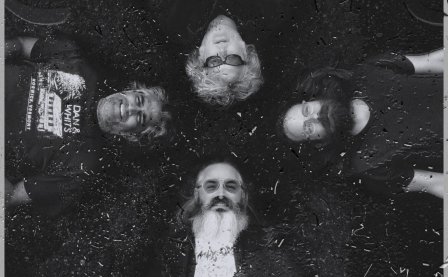At first listen, all seven songs on Wooden Shjips’ West sound pretty much the same. While the album — a clean, well-balanced, and lucid studio release — represents a departure from the lo-fi sound established on a wide collection of self-produced singles, EPs, albums, and compilations, there is a definite lack of timbral variety from track to track. The combination of omnipresent distorted guitars, disembodied vocals projected on a second plane, deeply buried organs, Hawkwind-esque solos, and echoey effects is certainly interesting, but the timbral consistency gives the same color to every track, thus stripping individual song identity and leaving a monochromatic, nondescript impression.
The music seems to be fueled by a back-to-basics approach; no complex chord progressions, just steady hypnotic rhythms alliterating in every single musical phrase in the album. But the sound of the electric guitars is where the true core of the music lies, providing complexity to the otherwise loose and simple structures. Indeed, West constitutes a comprehensive lecture on a fraction of the history and theory of guitar distortion. The band employs ‘snippets’ from several landmarks in the last five decades of fuzz sound: from The Ventures’ “2000 Pound Bee” (logic for the construction of riffs, as in the up-tempo “Lazy Bones”), passing through Faust’s “Krautrock” (drony instrumental passages, such as portions of “Black Smoke Rise” or “Crossing”), and arriving at The Jesus and Mary Chain and The Dead C (violent guitars imposed over ethereal voices).
But Wooden Shjips mostly visit some of Spacemen 3’s foggy excursions from the late 80s (Peter Kember participated in the mastering process), where the distorted, repetitive layers are intended to create some sort of trance in which the listener is engulfed (with or without help of any psychotropic substance) and the perception of natural time is compressed to the point where the musical event itself imposes its own temporal rules. Thus, there is no horizontality in this music, just pure vertical sonic development, ascending slowly through a soothing spiral but never reaching great heights and instead going back to the place of departure. These time-loops are best represented in the monotonous “Looking Out,” which follows the patterns found in the other songs, but reduces its elements to a primeval state through six minutes of iterations of the same groovy rhythmic cell.
The fuzz sound found here doesn’t stick to a particular era, creating instead a sense of ‘atemporality’ and acquiring a symbolic dimension that transcends the clichéd ‘psychedelic’ tag. This dimension refers to that zone where the cold aggressiveness and the comfortable warmth of the fuzz guitars are in constant struggle, never resolving the conflict and leaving the listener in a state of permanent inconclusiveness. But simultaneously, without a distinct historical reference, Wooden Shjips seems to be lost in time, wandering back and forth, hopping from year to year in a defective time machine without finding a place and time of their own. There are certainly moments of well-crafted, spaced-out music, but West is not as overwhelming as it could be. And to be honest, even after several listens, all the songs in West still sound pretty much the same.
More about: Wooden Shjips




